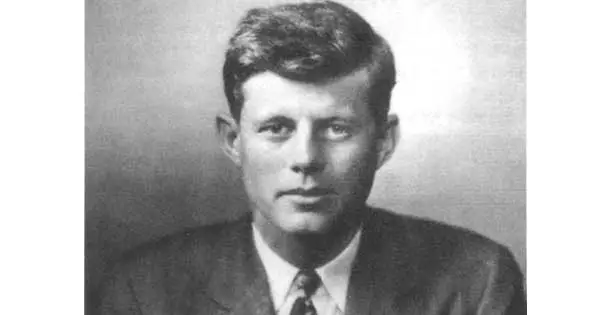On 24th July 1945, a young American journalist named John F. Kennedy stepped foot on to Irish soil for the first time.
It was a special moment for the future president, as he followed in the footsteps of his father in visiting the country of his ancestors. He recorded all of his thoughts and feelings during his two-day stay in his diary, which was published by his long-time assistant Deirdre Hendersen in 1995.

Ireland obviously had a massive effect on the 28-year-old Kennedy. He wrote nine pages about the events of just two days, when his entire trip across Europe only totalled 49 pages.
Kennedy had taken the opportunity to visit Europe, and Ireland, on the advice of his father. Seven years previously Joseph Kennedy had been sent by President Roosevelt to give the American stance on the negotiations between Britain and Ireland regarding the access to military bases during the Second World War.
Prime Minister Neville Chamberlain told his cabinet that Kennedy “had spoken strongly to him of the valuable effect on opinion in America of an agreement with Éire”.
Britain eased their demands from Ireland, and gave them back three naval bases gained in the signing of the Anglo-Irish Treaty. This freedom enabled Ireland to stay neutral in the War.
Kennedy was thanked by Éamon de Valera with an honourary doctorate from the National University. When he picked up the award he told a journalist: “My parents and my grandparents talked ever of Ireland, and from my youth I have been intent upon this pilgrimage.”
Seven years later, Joseph’s son John F. Kennedy made the same trip as part of a tour of Europe to raise his profile ahead of a run for congress.
Ireland had not long had its status as an independent republic and was awash with nationalist sentiment.
Interview with Taoiseach Éamon de Valera
Kennedy interviewed Taoiseach Eamon de Valera and wrote extensively about it in his diary: “I left England yesterday to come to Ireland. World attention has been turned again to Mr de Valera due to his recent remark in the ‘Irish Dáil’ that Ireland was a Republic.
Kennedy spoke at length with de Valera and displayed a great knowledge of the Irish political structure, and the history of rebellion.
He remained respectful of de Valera throughout his accounts, despite not sharing his hatred of Britain or some of his political ideals.
Kennedy wrote: “He has fought politically in the Dáil the same battle he fought militarily in the field – a battle to end partition, a battle against Britain.”
It was during Kennedy’s stay that the news broke that Winston Churchill had lost his place as British Prime Minister after losing the general election.
Although the news came as a surprise, Kennedy had suggested months earlier that there could be a shift in the British mood: “There are millions of young voters who will be voting for the first time and no one is sure which way they’ll go. While Churchill’s strength is undisputed, it is not certain he can buck the recent surge to the left.”
Kennedy left Ireland after two days to continue his tour of Europe. When he returned to America he was elected into congress.
He went back to Ireland two years later to visit his sister who was staying at Lismore Castle. During this trip he had more time to explore the country and met up with some of his distant relatives. He described the experience as “a flow of nostalgia and sentiment”.
The next time Kennedy visited Ireland came in 1963, when he was President of the United States.
More on President Kennedy
Take a look inside President Kennedy’s ‘Wexford’ holiday home retreat
Jackie Kennedy wrote to Irish priest about her anguish over the president’s flirting
Who Killed Dorothy Kilgallen – the reporter investigating President Kennedy assassination?
Jackie Kennedy believed Elizabeth Taylor had affair with JFK
JFK phoned Judy Garland so she could sing his favourite song
In 1945, the future President Kennedy made his first trip to Ireland
Newly found love letters from Jackie Kennedy reveal why she married Onassis
Letters written by Jackie Kennedy describe her ‘fairytale visit’ to Ireland